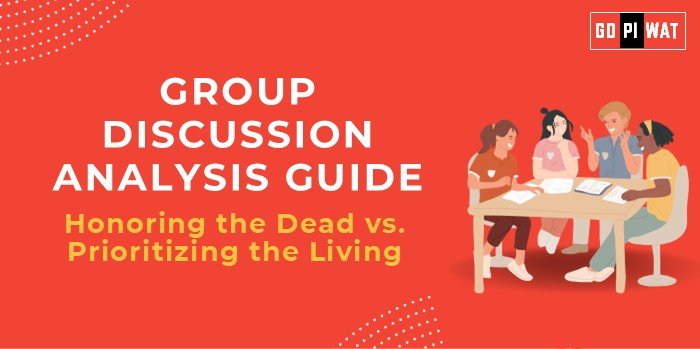📋 Group Discussion (GD) Analysis Guide: Honoring the Dead vs. Prioritizing the Living
🌐 Introduction to the Topic
Opening Context: Throughout history, societies have grappled with balancing respect for the wishes of the deceased against pressing needs of the living. This topic is increasingly relevant in debates surrounding ethical wills, organ donation, and cultural preservation.
Topic Background: The conflict between honoring the dead and prioritizing the living often arises in contexts such as estate distribution, body donation for science, or maintaining unused burial lands. Philosophical doctrines like utilitarianism and deontology offer differing perspectives on resolving these dilemmas.
📊 Quick Facts and Key Statistics
- Organ Donation Gap: Globally, over 100,000 people die annually due to lack of organs, even as many willing donors’ wishes remain unhonored.
- Cultural Preservation: UNESCO lists over 1,000 endangered cultural practices tied to burial traditions, raising debates about modernization vs. tradition.
- Estate Disputes: 25% of legal battles in developed countries involve contested wills, highlighting tensions between the dead’s wishes and the living’s needs.
👥 Stakeholders and Their Roles
- Governments: Create legal frameworks balancing respect for traditions with societal needs (e.g., organ donation laws).
- Families: Serve as intermediaries, weighing personal emotions and practical realities.
- Legal Systems: Ensure the deceased’s wishes are upheld unless overridden by public necessity.
- Cultural Organizations: Advocate for preserving traditions that reflect collective identity and heritage.
📈 Achievements and Challenges
🏆 Achievements
- Legislation: Countries like Spain and Belgium enforce presumed consent for organ donation, saving thousands of lives.
- Technological Solutions: Digital wills and blockchain-based estate management streamline honoring the deceased’s wishes.
- Cultural Adaptation: Communities have blended old traditions with modern needs, like eco-friendly burials.
⚠️ Challenges
- Emotional Conflicts: Family disputes over conflicting interpretations of a will or wish.
- Practical Constraints: Scarcity of land for burial or lack of resources for preserving remains.
- Legal and Ethical Dilemmas: Cases like posthumous reproduction or the ethical use of indigenous burial sites.
🌍 Global Comparisons
- Spain’s Organ Donation System: Achieves high donation rates through presumed consent.
- Japan’s Burial Innovations: Introduced vertical and digital graves to address land scarcity.
📚 Structured Arguments for Discussion
- Supporting Stance: “Honoring the deceased’s wishes is a testament to ethical responsibility and respect for autonomy.”
- Opposing Stance: “Society’s survival and well-being must take precedence over the dead’s preferences, especially in crises.”
- Balanced Perspective: “While honoring the deceased is important, exceptions are justifiable when broader societal needs are at stake.”
🎯 Effective Discussion Approaches
- Opening Approaches:
- Philosophical Start: “How does respecting the dead’s autonomy shape our humanity?”
- Data Insight: “Organ donation gaps have cost over 100,000 lives annually…”
- Counter-Argument Handling:
- Acknowledge emotional and ethical significance.
- Present pragmatic solutions or compromises.
🔍 Strategic Analysis of Strengths and Weaknesses
- Strengths: Promotes societal values of empathy and responsibility.
- Weaknesses: Risks inefficiency and resource misuse.
- Opportunities: Encourage adaptive traditions and sustainable policies.
- Threats: Social conflicts and ethical debates.
📈 Connecting with B-School Applications
- Real-World Applications: Ethical decision-making models in business, estate planning, or CSR policies.
- Sample Interview Questions:
- “How can companies balance legacy preservation with innovation?”
- “Are ethical compromises justifiable in business for survival?”
- Insights for B-School Students:
- Explore frameworks like utilitarianism and ethics in leadership.
- Analyze how modern organizations manage conflicting interests.


